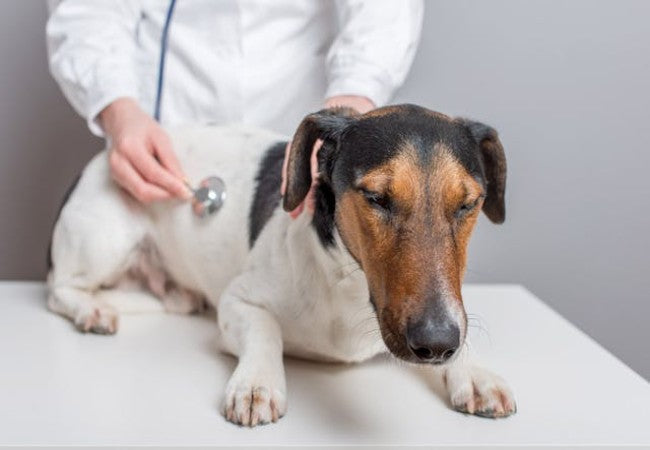Veterinary Guide to Canine Renal (Kidney) Adenocarcinoma 2025 🐶

In this article
Veterinary Guide to Canine Renal Adenocarcinoma (Renal Cell Carcinoma) 2025 🩺🐶
By Dr. Duncan Houston BVSc
🧬 What Is Renal Adenocarcinoma?
Renal adenocarcinoma, also called renal cell carcinoma, is a malignant tumor originating from the tubular epithelium of the kidney. It’s the most common primary kidney cancer in dogs, though rare overall (<1% of canine tumors).
👥 Who Is Affected?
- Age group: Primarily older dogs (middle-aged to senior), but rare juvenile forms exist like nephroblastoma in dogs under 1 year.
- Breeds: No strong breed predisposition, but German Shepherds can develop hereditary cystadenocarcinoma with skin nodules.
- Sex/size: More common in medium to large breeds; may be slightly more frequent in males.
⚠️ Clinical Signs
Symptoms are often nonspecific and may include:
- Weight loss, reduced appetite, and lethargy.
- Polydipsia/polyuria—due to disruption of normal kidney function.
- Hematuria or proteinuria—blood or protein in urine, though not always present.
- Enlarged abdomen—if the tumor grows large or is bilateral.
- Signs of systemic illness: vomiting, anemia, or high blood pressure in advanced stages.
🔍 Diagnosis Approach
- CBC, chemistry, urinalysis: Identify anemia, renal values, protein, or blood in urine.
-
Imaging:
- Ultrasound: Detects mass in kidney—hyperechoic, irregular shape.
- X-rays/CT chest–abdomen: Detect metastasis to lungs, lymph nodes, liver.
- Fine-needle aspirate or biopsy: Confirms epithelial cancer; immunohistochemical markers like Pax8 aid diagnosis.
- Staging: Evaluate metastasis (lungs, opposite kidney, liver, adrenal glands).
- Genetic testing: For German Shepherds—check FLCN mutation if cystadenocarcinoma suspected.
🛠️ Treatment Options
1. Surgical Removal (Nephrectomy)
- Standard treatment for unilateral kidney cancer ~8–16 months survival, up to 4 years in non-metastatic cases.
- Pre-surgical liver function testing is recommended.
2. Chemotherapy & Adjunct Treatment
- Adriamycin or carboplatin can be used post-op for metastatic disease—data limited.
- Radiation therapy is rarely used due to kidney sensitivity and limited evidence.
3. Supportive & Palliative Care
- Manage renal insufficiency with fluids, appetite stimulants, antihypertensives.
- Control anemia, pain, and secondary infections as needed.
- Monitor renal function and blood pressure regularly.
📈 Prognosis
- Survival 8–16 months; up to 4 years with complete removal and no metastasis.
- Metastasis present at diagnosis in ~50%; poor prognosis.
- Cystadenocarcinoma in German Shepherds may progress more slowly but becomes bilateral; genetic counseling is advised.
🏡 Home Care & Monitoring
- Frequent vet check-ups (every 2–3 months) – bloodwork, imaging as needed.
- Control blood pressure and hydration with fluids and diet.
- Watch appetite, elimination habits, activity levels, and any new symptoms.
📱 Ask A Vet Telehealth Support
- 📸 Photo uploads of abdomen/swelling for early identification.
- 🔔 Medication and fluid therapy reminders.
- 🩺 Video consults to review appetite, urination, breathing, and pain.
🎓 Case Spotlight: “Max” the Labrador
Max, a 9‑year‑old Labrador Retriever, presented with weight loss, increased thirst, and mild hematuria. Abdominal ultrasound revealed a 6 cm mass in the right kidney with no visible metastases on chest CT. Fine‑needle aspirate confirmed renal cell carcinoma. He underwent unilateral nephrectomy, followed by Adriamycin chemotherapy. With supportive care (blood pressure medication, renal diet), Max remained active and comfortable at 18 months post-surgery. Ask A Vet provided remote check‑ins, medication reminders, dietary support, and home delivery of supplements. 🐕
🔚 Key Takeaways
- Renal adenocarcinoma is the most common primary kidney tumor in dogs, though overall rare.
- Early stages present with subtle signs—weight loss, drinking more, occasional blood in urine.
- Renal ultrasound and biopsy are essential for accurate diagnosis.
- Nephrectomy offers the best chance—survival 8–16 months, up to 4 years without spread.
- Chemotherapy may help in metastatic cases; supportive care is crucial for quality of life.
- German Shepherds with skin nodules may have genetic cystadenocarcinoma—testing advised.
- Ask A Vet telehealth integrates remote monitoring, medication management, surgical coordination, and holistic care support 📲🐾
Dr Duncan Houston BVSc, founder of Ask A Vet. Download the Ask A Vet app to support your dog through kidney cancer—from initial evaluation and surgery planning to chemo delivery, diet coaching, and ongoing telehealth follow‑ups 🐶📲






